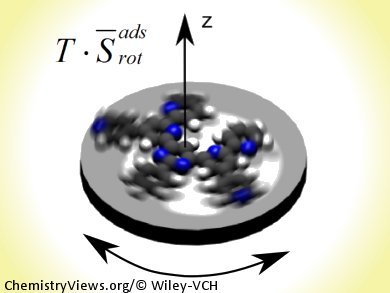New real-time observations of the motion of individual organic molecules adsorbed on a metal surface suggest that the entropy – or microscopic disorder – of rotating species plays a crucial role in the stability of such systems. Jürgen R. Behm, Thomas Waldmann, and colleagues, University of Ulm, Germany, applied fast scanning tunneling microscopy (video-STM) to study a mixture of rotating and non-rotating bis(terpyridine) molecules on a silver surface in real time and at different temperatures.
The researchers carried out a statistical evaluation of more than 8000 molecules from the recorded images and found that the system was significantly stabilized by the entropy of the rotating molecules. It turned out that this is a general effect that increases with the moment of inertia and thus with the size of the molecules. According to the researcher, the results gained in this work give new insights into the interactions involved at the interfaces between electrodes and organic layers. Such types of interfaces are found in many new devices including sensors, organic light-emitting diodes, and organic thin-film transistors.
- Stabilization of Large Adsorbates by Rotational Entropy: A Time-Resolved Variable-Temperature STM Study,
T. Waldmann, J. Klein, H. E. Hoster, R. J. Behm,
ChemPhysChem 2012, 13.
DOI: 10.1002/cphc.201200531




